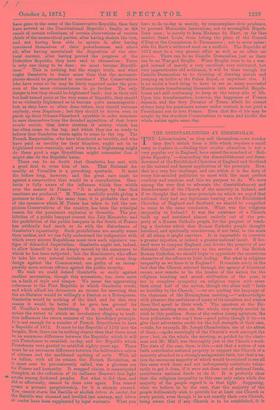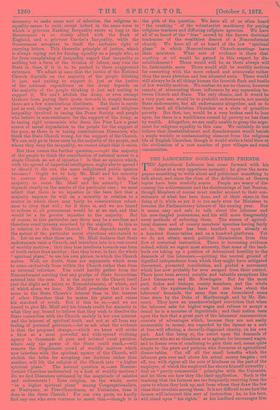THE DISESTABLISHERS AT BIRMINGHAM:
THE Liberationists,' as they call themselves,—we wonder they don't shrink from a title which requires a small essay to explain it,—finding that secular education is not a very popular cry in England, have raised the standard of "Reli- gious Equality,"—demanding the disestablishment and disen- dowment of the Established Churches of England and Scotland as.the natural' and honest application of the principle. Now, that is a very fair challenge, and one which it is the duty of every fair-minded politician to meet with the most perfect courtesy and candour, and this we purpose to do. We were among the very first to advocate the disestablishment and disendowment of the Church of the-minority in Ireland, and if we thought that the same principle on which we urged that national duty had any legitimate bearing on the Established Churches of England and Scotland, we should be compelled to come to the same conclusion. What was the religious inequality in Ireland ? It was the existence of a Church built up and sustained almost entirely out of the pro- perty of a Roman Catholic people, for the purpose of teach- ing a doctrine which that. Roman Catholic people thought heretical, and spiritually mischievous, if not fatal, to the souls of all whom it might convince. It is impossible to conceive a greater injustice, or indeed, a greater national insult. If Ire- land were to conquer England, and devote the property of our National Church exclusively to the service of the British Roman Catholics, we should begin to appreciate the monstrous character of the offence to Irish feeling. But what is religions inequality as we have it in England ? It consists solely in the fact that the Church selected through the agency of historical causes now remote to be the trustee of the nation for the religious teaching and moral civilisation of the poor, is not in complete sympathy on religious topics with more than about half of the nation, though the other half " feels. no hostility to the Church,"—we are quoting the language of the chairman of the Birmingham meeting,—" acknowledges with pleasure the usefulness of many of its members, and wishes them God speed in their work." The speakers at the Bir- mingham meeting were, on the whole, very wisely careful to stick to this position. Some of the rasher young agitators, the born politicians who can't bear—good policy though it be—to give their adversaries credit for the full strength of their case, —take, for example, Mr. Joseph Chamberlain, one of the ablest of them,—spoke sneeringly of the Church's work amongst the poor ; but, on the whole, the meeting, as guided by the chair- man and Mr. Miall, was thoroughly just to the Church's work. The state of the case, then, is this ;—not that a nation of one faith contributes national property to support the Church of a minority attached to a strongly antagonistic faith, but that a na- tion the enormous majority of which would be rejoiced to see all this same work done, and not unfregnently contribute volun- tarily to get it done, if it were not done out of national funds, contributes national funds to do it. It is perfectly clear that the religious inequality in this case only exists while the majority of the people regard it in that light. Supposing, what we believe to be the case, that the majority of the people deliberately wish to provide for at least one Church in every parish, even though it be not exactly their own-Church, being aware that if any Church is to be established, it is
necessary to make some sort of selection, the religious in- equality ceases to exist, except indeed in the same sense in which a grievous Banking Inequality exists so long as the Government is so closely allied with the Bank of England, and a grievous Carrier's Inequality, while the Government arrogates to itself the exclusive right of carrying letters. This theoretic principle of justice, which is always crying out for forcing equality on a people who, so far from complaining of inequality, regard that inequality as nothing but a form of the division of labour, may ruin the State in time, if it is to be pushed to these exaggerated extremes. We admit at once that the justice of the National Church depends on the majority of the people thinking it just, and uniting to support it, just as the justice of the national expenditure on the Army depends on the majority of the people thinking it just and uniting to support it. We can't abolish the Army, or even exempt Quakers from paying their quota towards it, simply because there are a few conscientious dissidents. But there is surely just as real, though not as extensive, a moral and religious inequality involved in taxing the Peace Society and people who believe in non-resistance for the support of the Army, or in taxing rigid economists who deem the Poor Law a great source of moral degradation to the people for the support of the poor, as there is in taxing conscientious Dissenters, who think the State Church wrong, for the support of the Church. We can only go in these cases by the majority of the people, and where they deny the inequality, we cannot admit that it exists.
But then comes the further question,—ought the majority of the people to think the contribution of national means to a single Church an act of injustice ? Is that an opinion which, with the spread of impartial intelligence, ought also to spread? or should it die out, the more enlightened public opinion becomes ? Ought we to help Mr. Miall and his minority to convert the majority, or ought we to help the majority to resist Mr. Miall and his minority ? That depends clearly on the merits of the particular case ; we must admit that there is no injustice in the bare fact that a .majority imposes its will on a minority in relation to a matter in which there may fairly be conscientious reluct- -ance to obey that will ; for if there is, and we are bound to redress it, all government would be at an end, and that would be a far greater injustice to the majority. But of course, in this particular case there may be a needless and therefore cruel tyranny exercised by the majority. Is this so in relation to the State Church ? That depends surely on the nature of the particular moral objections entertained to it. Let us see what these are. Mr. Miall declares that State . endowments taint a Church, and introduce into it a vast crowd of worldly motives ; that they bias intellects towards one form of truth rather than another ; that they lower, in fact, the whole "spiritual plane," to use his own phrase, in which the Church moves. Well, no doubt, these are arguments which seem to come exclusively from within the Church rather than from an external reformer. You could hardly gather from the Nonconformist meeting that any grudge of State favouritism entered into the case. It is the injury to the Church itself (not the slight and injury to Nonconformists), of which, and of which alone, we hear. Mr. Miall proclaims that it is far more in the State Church's interest than in the interest of other Churches that he makes his plaint and raises his standard of revolt. But if this be so,—and we are .bound to give Mr. Miall and his friends credit for sincerity in what they say, bound to believe that they wish to dissolve the State connection with the Church mainly in her own interest and the interest of spiritual truth, and not at all from any feeling of personal grievance,—let us ask what the evidence is that the proposed change,—which we know will strike .a blow at a most powerful and wide-spread civilising agency in thousands of poor and isolated rural parishes, where only the power of the State could reach,—will remove the illegitimate crowd of worldly motives which now interfere with the spiritual agency of the Church, will abolish the bribe for accepting one doctrine rather than another, will lift the religion of the Church into "a higher spiritual plane." The natural question is,—are Noncon- formist Churches undisturbed by a host of worldly motives ? Do we find Dissenters unbiassed by the magnitude of salaries and endowments ? Does religion, on the whole, move "in a higher spiritual plane" among Congregationalists, or Wesleyans, or Free-Churchmen, or Unitarians, than it does in the State Church ? For our own parts, we hardly find any one who even ventures to assert this,—though it is the pith of the question. We have all of us often heard "the creaking" of the voluntaryist machinery for paying religious teachers and diffusing religious agencies. We have all of us heard of the " bias " caused by the known doctrinal tendencies of the wealthiest deacon of a Nonconformist church. We have all of us heard of the low "spiritual plane" in which Nonconformist Church-meetings leave their ministers. What sort of evidence is there that anything at all would be gained in this respect by die-
establishment There would still be, as there always will be, fashionable sects. There would still be worldly motives for consorting with the more refined and aristocratic rather than the more plebeian and less educated sects. There would still always be in all things human the feverish flush and bustle of low worldly motives. We confess we see no chance, however remote, of attenuating these influences by any separation be- tween Church and State. The only chance, and it would be a very poor one, would be to prohibit endowments, not merely State endowments, but all endowments altogether, and so to throw back all Christian Churches on a state of primitive poverty. But that, too, would be a very broken reed to lean upon, for there is a worldliness caused by poverty no less than by wealth. Altogether, we are really unable to grasp the argu- ment for religious equality in this case. We certainly do not believe that diseetablishment and disendowment would banish a single worldly or contaminating element from the religious life of English Churches, though it would strike a fatal blow at the civilisation of a vast number of poor villages and rural communities.



































 Previous page
Previous page